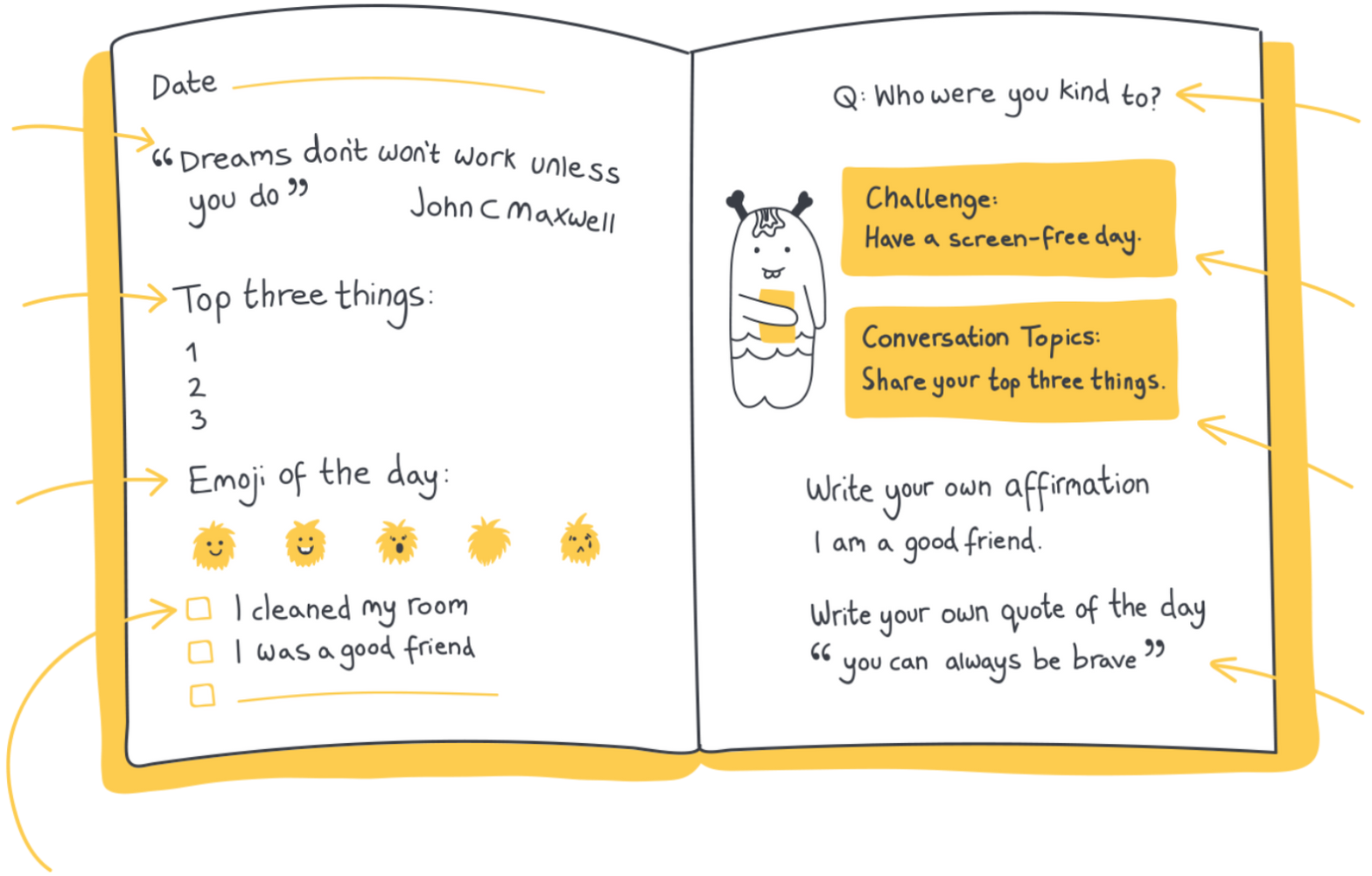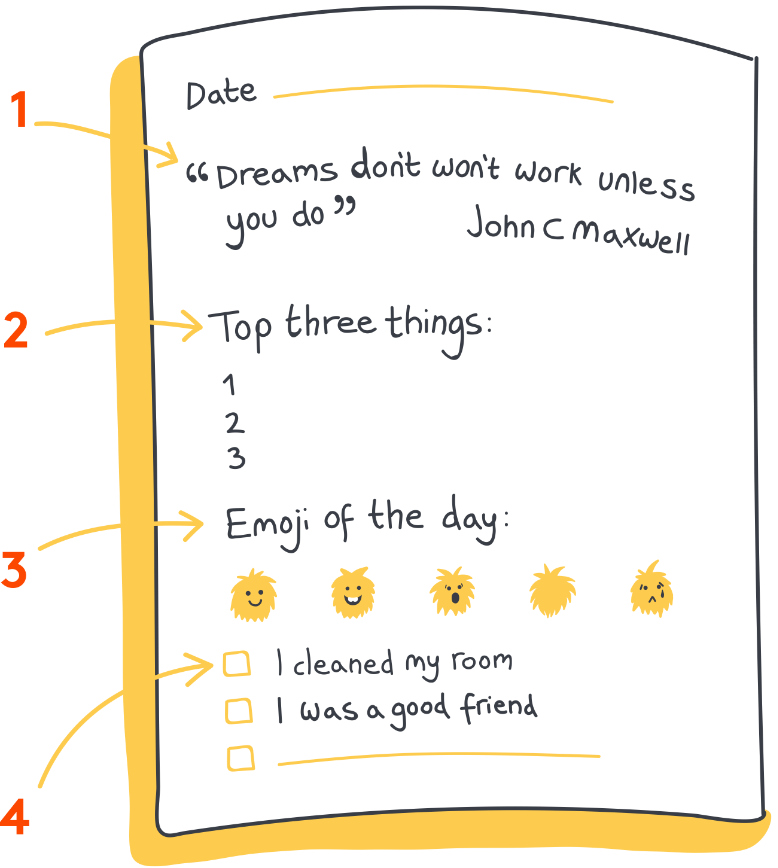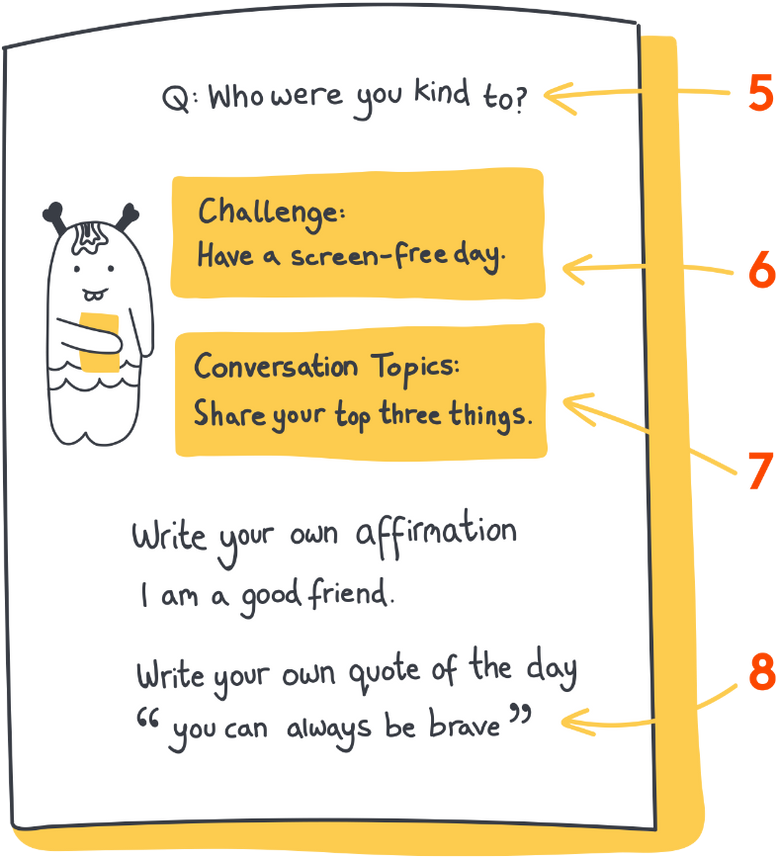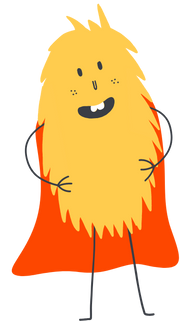Daily journals to promote happiness, develop positive habits and nurture inquiring minds
See why HappyMe is recommended by pediatricians, psychologists, parents and teachers
“A nourishing resource based on research”
As a psychologist and a mother, I highly recommend The HappyMe Journal. It is a nourishing resource based on research into the building blocks to wellbeing and expertly guide children through their emotions and the challenges that naturally arise in their day. While they help children develop the core skills of mindfulness, gratitude and growth mindset, they don’t feel like work – they feel light-hearted, visually appealing, engaging and genuinely joyful.
– Suzy Reading, Chartered Psychologist and Coach and mother of two
“The HappyMe Journal is an excellent tool!”
The HappyMe Journal is an excellent tool to help introduce children to these essential life skills.
I strongly believe that, if we could support children in developing their emotional intelligence using tools like the HappyMe Journal, we would see a reversal in the trend of increasing hospital presentations and equip our children with essential skills for their future.
– Phil Parslow, Consultant Pediatrician, Dorset County Hospital, NHS Foundation Trust
“Such a positive impact on my 8 year old”
Every child should have this book. It has had such a positive impact on my 8 year old in just 5 days. Even her 15 year old brother has commented on the change! She is more determined, doesn’t cry when she fails and has looked for positives in everything. As a teacher for 10 years, I have seen so many children struggle with self belief and give up when faced with difficult problems. I taught Zippy Friends which helped with emotional health and P4C (Philosophy for Children) which also helped them look at things differently. I can honestly say, this lovely little book is brilliant.
– Sharon, Teacher
“An absolute MUST-HAVE for any child or teen”
The HappyMe Journal is an absolute MUST-HAVE for any child or teen. This journal is the perfect resource to help your child develop their emotional awareness and develop the tools and habits that will continue to support their mental and emotional wellbeing. Also perfect if your little one struggles to talk about their feelings as the questions and prompts encourage children to share their emotions in a safe way. I recommend this journal to all of my clients (and they are just as helpful for us adults too!)
– Natalie Costa, award winning children’s coach, author of Power Thoughts
Based on the science of happiness and wellbeing
Our daily journals for children and young adults use scientifically proven methods to promote happiness, develop healthy habits for life and nurture curiosity. Beautifully illustrated and easy to use, with just a few minutes focus each day children benefit by being encouraged to express gratitude, reflect on their emotions and think about their actions.
The results are positive and plentiful: thousands of parents have told us about better sleep, reduced anxiety, improved connection and communication, increased kindness and more positive mindsets in their children.
Journals sold
since 2018
EIGHT
LANGUAGES
100+
COUNTRIES
Inside our Junior edition
Filled with simple research backed practices, the daily pages foster the habits that have been shown to positively influence mood and mindset.



1
Quote of the day to help you be positive and strong
2
Top 3 things is all
about gratitude
3
To help you reflect
on your day
4
These little checklists will help you remember little moments and help you develop
a growth mindset
5
Questions will help you think about your week
6
You can get your family involved too
7
Try out these conversation topics at mealtimes with your family
8
Write your own quote or affirmation

“My kids have been instrumental in helping make the content just right and have been my inspiration all along. So, from my family to yours, I hope our journal gives your children the foundations for a happy and balanced life”
6 ways HappyMe works
1. Gratitude
2. Mindset
3. Kindness
4. Mindfulness
5. Digital wellbeing
6. Self-awareness
1. Gratitude
Keeping a gratitude journal is one of the most well-established happiness practices and the easiest to do. Practicing gratitude is central to the journal and encourages children to reflect on three positives a day. Research has shown that practicing gratitude in this way increases a sense of happiness as well as a range of physical, psychological and social benefits.
2. Mindset
Many schools are now introducing the concept of a ‘growth mindset’ as a way to support a positive learning attitude. Pupils with a growth mindset display greater self-esteem and increased resilience. Our daily checklists and positive quotes remind children about the importance of not giving up when faced with challenges.
3. Kindness
Much research is currently being done into the wide ranging and profound emotional and physical benefits of kindness. In particular, studies with children show that behavior leading to the enhanced welfare of others (kindness!) promotes increased physical and mental wellbeing. Our daily pages encourage kindness in a number of simple ways to reinforce this positive behavior.
4. Mindfulness
Mindfulness has been linked through numerous studies to psychological and physical wellbeing. The simple act of journaling is in itself an act of mindfulness and our daily pages further prompt children to try a range of mindful activities. Mindfulness positively affects our brains, making the areas dealing with empathy, memory and emotional regular more interconnected. The result is less stress, better sleep and more attentive behavior.
5. Digital wellbeing
Children and teens (and their parents!) can be very distracted by social media, gaming and digital devices which can contribute to anxiety and other mental health issues. HappySelf encourages a mindful use of technology as well as screen-free family time.
6. Self-awareness
Cultivating self-awareness and allowing children to show a true range of emotions is a proven route to happiness. Our ‘emoji of the day’ encourages children to reflect on their emotions on a daily basis.










































